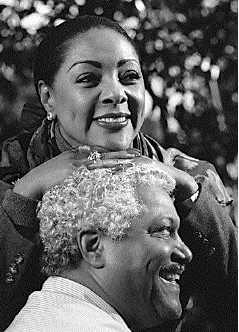Today's "black elderly are better fed, better housed and in better
health than in earlier eras," reports James S. Jackson, writing in the
Encyclopedia of Aging.
Thanks are due to Medicare, Social Security and other social insurance
activities, according to Jackson, a professor at the Institute for
Social Research at the University of Michigan. "Most of this
improvement is attributable to government assistance programs, still
the prime support of black Americans in older age groups.
Unfortunately, a larger proportion of blacks, because of histories of
poor occupational opportunities, lack of wealth, and private
retirement funds, are heavily dependent on these government programs,"
Jackson wrote.
Elderly African-Americans are among the poorest of the aged, with the
lowest lifetime earnings, and the least chance of having a pension, or
having accumulated any savings. One of every seven aged
African-Americans (14.4%) received Supplemental Security Income (SSI)
payments in 1994, compared with one out of every 29 whites (3.3%). SSI
is a special program, funded by general revenues, to provide payments
to poor people who are elderly, blind or disabled.
Similar economic problems afflict elderly Hispanics, with lower
lifetime earnings, little savings, and scarce pensions.
The poverty rate in 1996 among Americans aged 65 and over was 9.4% for
whites, 24.4% for Hispanics, and 25.3% for African-Americans.
Social Security and other federal benefits are vital because of the
huge income and wealth disparities among different groups of
Americans. Low incomes during a working career leave little money for
saving and scant opportunity to amass wealth for retirement, or for
transfer to the next generation.

Racial and ethnic differences in wealth are "enormous," according to a
1995 study by James Smith of the Rand Research Institute. For a
middle-aged household, with persons between 51 and 61, the time when
savings should be building up, the numbers are striking: for every
dollar of wealth owned by a white household, a black household has 27
cents, and a Hispanic household has 30 cents. With no existing
wealth - hardly any bank savings, stocks, or bonds - the members of
minority groups have nothing to depend on for support except Social
Security.
Smith pursued the concept of wealth as persons aged, looking at assets
of households aged 70 and above. More than 25% of African-Americans
and a third of Hispanics had "no wealth at all - a figure that is even
more dramatic given how broad our wealth concept is. Remember wealth
includes net equity in homes," Smith said in his report.
For the poorest elderly households, white as well as African-American
and Hispanic, Social Security is the only line of defense against
destitution and deprivation. Smith looked at the bottom 10% of
households ranked by wealth, and discovered that their right to a
Social Security check is their only asset of value. "In a nutshell, it
is basically the only wealth they have. Seventy percent of the total
wealth of these households rests in their future Social Security
checks."
Social Security and other federal benefits are vital because of the
huge income and wealth disparities among different groups of
Americans.








